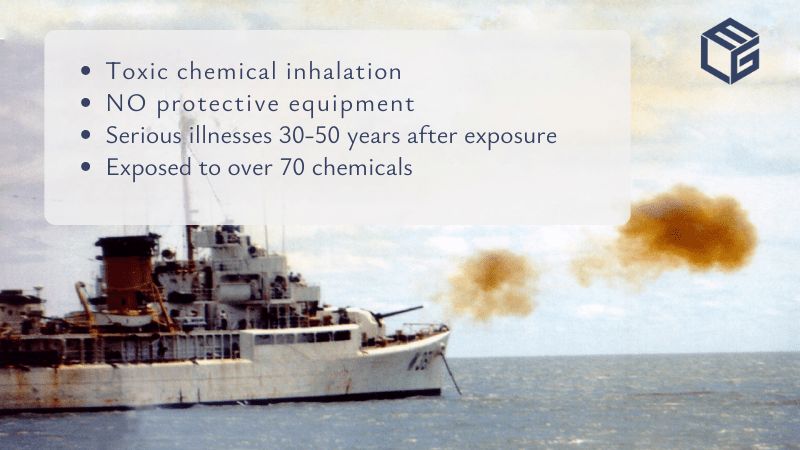These products include, but are not limited to:
Because of its insulating and fire-retardant properties, asbestos was initially hailed as a life-saver by the U.S. Armed Forces, and by civilian industries across the country. Its benefits seemed to know no bounds, and for decades all signs to the contrary were ignored. Most at risk among the Coast Guard servicemen and women were those directly exposed to asbestos in shipyard work, whether it was shipbuilding, maintenance, or repairs. Since asbestos is brittle and easily releases fibers into the air if not wet or if its surface tension is broken, exposure was almost impossible to avoid when doing work on older vessels.
Even mere travel on ships rich in asbestos products could expose the crew to toxic fibers since almost all insulating products between the 1930s and the 1970s contained asbestos. Boilers were among the richest in asbestos, followed by electrical insulation and asbestos reinforcement in walls around the ship. Practically anywhere you turned in the confined space of a Coast Guard ship, asbestos was sure to be there. And, on those ships or buildings that are still in use decades later, the danger is still there. Nearly 250 Coast Guard cutters were built with asbestos or asbestos-containing products. This widespread use of asbestos means that U.S. Coast Guard veterans face some of the highest risks of developing asbestos-related diseases among the branches of the military.
Structural and mechanical components containing asbestos include:
The use of asbestos in the U.S. Coast Guard
U.S. Coast Guard locations associated with asbestos:
- U.S. Coast Guard Alameda, California
- U.S. Coast Guard Island Alameda, California
- U.S. Coast Guard Long Beach Base, California
- U.S. Coast Guard Yard, Baltimore, Maryland
- U.S. Coast Guard Sebago Lake, Maine
- U.S. Coast Guard Base San Juan Municipio, Store House, Puerto Rico
- U.S. Coast Guard Navigation School, Groton, Connecticut
- U.S. Coast Guard Gulfport, Mississippi
- U.S. Coast Guard Air Station, New York
- U.S. Coast Guard Station, Tybee Island, Georgia
- U.S. Coast Guard Station, Islamorada, Florida
- U.S. Coast Guard Air Station, St. Petersburg, Florida
- U.S. Coast Guard Station, Panama City, Florida
- U.S. Coast Guard Station, Yankeetown, Florida
Almost every cutter built between the 1930s and 1991 contained asbestos. Here are just some of them:
- USCGC Absecon (WHEC-374)
- USCGC Active (WMEC-618)
- USCGC Acushnet (WMEC-167)
- USCGC Alert (WMEC-630)
- USCGC Androscoggin (WHEC-68)
- USCGC Barataria (WHEC-381)
- USCGC Bering Strait (WHEC-382)
- USCGC Bibb (WPG-31)
- USCGC Boutwell (WHEC-719)
- USCGC Campbell (WPG-32)
- USCGC Casco (WHEC-370)
- USCGC Castle Rock (WHEC-383)
- USCGC Chase (WHEC-718)
- USCGC Chautauqua (WHEC-41)
- USCGC Chincoteague (WHEC-375)
- USCGC Confidence (WMEC-619)
- USCGC Cook Inlet (WHEC-384)
- USCGC Coos Bay (WHEC-376)
- USCGC Courageous (WMEC-622)
- USCGC Dallas (WHEC-716)
- USCGC Dauntless (WMEC-624)
- USCGC Decisive (WMEC-629)
- USCGC Dependable (WMEC-626)
- USCGC Dexter (WHEC-385)
- USCGC Diligence (WMEC-616)
- USCGC Duane (WPG-33)
- USCGC Durable (WMEC-628)
- USCGC Escanaba (WHEC-64)
- USCGC Escape (WMEC-6)
- USCGC Gallatin (WHEC-721)
- USCGC Gresham (WHEC-387)
- USCGC Haida (WPG-45)
- USCGC Half Moon (WHEC-378)
- USCGC Hamilton (WHEC-715)
- USCGC Hamilton (WPG-34)
- USCGC Humboldt (WHEC-372)
- USCGC Ingham (WPG-35)
- USCGC Iroquois (WHEC-43)
- USCGC Jarvis (WHEC-725)
- USCGC Klamath (WHEC-66)
- USCGC Mackinac (WHEC-373)
- USCGC Matagorda (WHEC-371)
- USCGC McCulloch (WHEC-386)
- USCGC Mellon (WHEC-717)
- USCGC Mendota (WHEC-69)
- USCGC Midgett (WHEC-726)
- USCGC Minnetonka (WHEC-67)
- USCGC Modoc (WPG-46)
- USCGC Mojave (WPG-47)
- USCGC Morgenthau (WHEC-70)
- USCGC Munro (WHEC-724)
- USCGC Owasco (WHEC-39)
- USCGC Pontchartrain (WHEC-70)
- USCGC Reliance (WMEC-615)
- USCGC Resolute (WMEC-620)
- USCGC Rockaway (WHEC-377)
- USCGC Rush (WHEC-723)
- USCGC Sebago (WHEC-42)
- USCGC Sherman (WHEC-720)
- USCGC Spencer (WPG-36)
- USCGC Steadfast (WMEC-623)
- USCGC Tampa (WPG-48)
- USCGC Taney (WPG-37)
- USCGC Unimak (WHEC-379)
- USCGC Valiant (WMEC-621)
- USCGC Venturous (WMEC-625)
- USCGC Vigilant (WMEC-617)
- USCGC Vigorous (WMEC-627)
- USCGC Winona (WHEC-65)
- USCGC Yakutat (WHEC-380)
- USCGC Yocona (ex-Seize) (WMEC-168)
While most of the Coast Guard’s asbestos-containing cutters have been decommissioned, some are still in service, and many were still active until 2017. The Coast Guard has initiated major renovations to remove asbestos-containing products on board its vessels, but it is unlikely that all of these products have been removed.
Surviving family members of deceased U.S. Coast Guard veterans are entitled to financial compensation
Surviving spouses and dependents of Coast Guard veterans who have died from an asbestos-related illness as a result of their service may be eligible for dependency and indemnity compensation. If their loved one has passed away from lung cancer, bronchial cancer, mesothelioma, asbestosis, and other asbestos-related pulmonary diseases, family members can also receive compensation from one or more of several trust funds created to provide financial compensation to victims and their families. Because the money comes from the asbestos trust funds which have been established to assist victims of asbestos exposure, the legal process involves no litigation and takes significantly less time to complete.
We handled thousands of asbestos exposure claims throughout the country and we have successfully recovered over $2 billion for over 25,000 asbestos-exposed clients and their families. We are highly experienced and skilled in protecting the rights of asbestos exposure victims and their family members.
Asbestos exposure jobs in the U.S. Coast Guard
